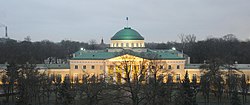Third All-Russian Congress of Workers', Soldiers' and Peasants Deputies' Soviets
| Third All-Russian Congress of Workers' and Soldiers' Deputies' Soviets | |||||
|---|---|---|---|---|---|
| |||||
 Tauride Palace | |||||
| Overview | |||||
| Legislative body | All-Russian Congress of Soviets | ||||
| Meeting place | Tauride Palace, Petrograd | ||||
| Term | 23 January 1918 [O.S. 10 January 1918] – 31 January 1918 [O.S. 18 January 1918] | ||||
| Party control | Social Democratic Labor Party (Bolsheviks) | ||||
The Third All-Russian Congress of Workers' and Soldiers' Deputies' Soviets (also called the Third All-Russian Congress of Soviets or the Third All-Russian Congress of Workers', Soldiers' and Peasants Deputies' Soviets) took place on 23-31 January 1918 [
Third All-Russia Congress of Soviets of Peasants’ Deputies
The Congress started out bringing together only Workers' and Soldiers' Deputies. However Third All-Russia Congress of Soviets of Peasants’ Deputies took place on 26 January 1918 [
Lenin described the Congress as having "opened a new epoch in world History” and that by establishing the organisation of a new state power created by the October Revolution it had "projected the lines of future socialist construction for the whole world, for the working people of all countries”.[5]
Agenda of the Congress
Occurring shortly after the Constituent Assembly had been dissolved by order of the All-Russian Central Executive Committee (VTsIK), the Congress resolved to expunge any references to the forthcoming Constituent Assembly from all new editions of decrees and laws of the Soviet Government, becoming thus the supreme body of national power and authority in Russia, with the VTsiK assuming its duties in between the sessions of the Congress.
The Congress received:
- Yakov Sverdlov's report on the activity of the All-Russian Central Executive Committee.
- Vladimir Lenin's report on the activity of the Council of People's Commissars.
- People's Commissariat of Nationalitieson the principles of federation and the nationalities' policy for the emerging Soviet state. The nationalities policy proposed was approved by the Congress.
Resolutions
The Declaration of Rights of the Working and Exploited People, which was proposed before the opening of the Congress, was passed and this went on to become the basis of the Soviet Constitution. It was also agreed to establish the Russian Soviet Federative Socialist Republic on the basis of a free union of the peoples of Russia.[6]
The Congress also approved the Decree on Land which provided the basic provisions of the redistribution and nationalization of land.[7]
The Mensheviks, Right Socialist-Revolutionaries and the Menshevik-Internationalists used the Congress to indicate their opposition to the domestic and foreign policy which the Bolsheviks passed.
References
- ^ "Speech delivered at the Third All-Russian Congress of Soviets of Workers', Soldiers' and Peasants' Deputies". www.marxists.org. Marxist Internet Archive. Retrieved 23 May 2019.
- ^ a b "The 3rd All-Russian Congress of Soviets completed its work". Presidential Library. Retrieved 23 May 2019.
- ^ a b "Third All-Russian Congress of Soviets of Peasants Deputies". TheFreeDictionary.com. The Great Soviet Encyclopedia, 3rd Edition. Retrieved 23 May 2019.
- ^ "Glossary of Events: All-Russian Conference of the Soviet". www.marxists.org. Marxist Internet Archive. Retrieved 23 May 2019.
- ^ Lenin, Vladimir. "Third All-Russia Congress Of Soviets Of Workers', Soldiers' And Peasants' Deputies[1]". Marxist.org. Marxist Internet Archive. Retrieved 23 May 2019.
- ^ Jonathan D. Smele,Historical Dictionary of the Russian Civil Wars, 1916–1926, Lanham, MD: Rowman & Littlefield, 2015, p. 317-318.
- ^ Third All-Russian Congress of Soviets of Workers', Soldiers' and Peasants' Deputies (January 23–31, 1918) accessed 2 October 2010
